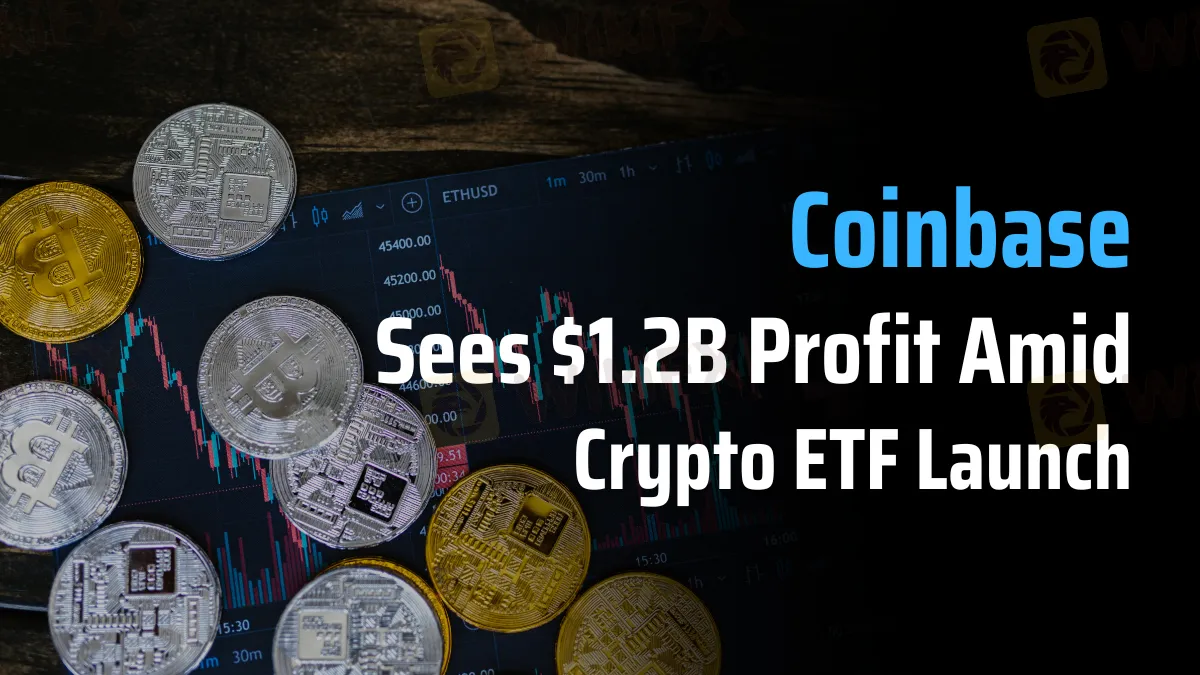简体中文
繁體中文
English
Pусский
日本語
ภาษาไทย
Tiếng Việt
Bahasa Indonesia
Español
हिन्दी
Filippiiniläinen
Français
Deutsch
Português
Türkçe
한국어
العربية
Coinbase Sees $1.2B Profit Amid Crypto ETF Launch
Abstract:Coinbase achieves a first-quarter profit of $1.2 billion following the launch of bitcoin ETFs and increased trading volumes.

Coinbase Global (COIN.O) announced a substantial improvement in its financial situation, generating over $1 billion in earnings in the first quarter. The loss recorded over the same time last year stands in sharp contrast to this. Gains in volume from trading cryptocurrencies after the first exchange-traded funds (ETFs) tracking Bitcoin were listed in the United States contributed significantly to the profit boom.
After a loss of $79 million, or $0.34 per share, the previous year, the company recorded a net income of $1.2 billion, or $4.84 per share, for the quarter ending March 31. Despite a positive results release, Coinbase shares dipped 2.5% in after-hours trading. The decrease happened after the typical trading session witnessed a roughly 9% increase.
Paul Marino, Chief Revenue Officer of GraniteShares, commented on the stock's performance. “Despite a very solid report, the stock traded lower after hours, with concerns that trading volumes might decrease based on the downward movement in bitcoin prices,” according to the analyst.

The trading environment underwent significant changes in January when the United States Securities and Exchange Commission approved the establishment of six Bitcoin-related ETFs. Bitcoin values rose to a new all-time high of about $72,000 in March after the acceptance, which came after a ten-year battle with the industry. The end outcome was a renewed interest in digital assets. Coinbase's trade volume increased from $145 billion in the same quarter last year to $312 billion this quarter as a result.
Coinbase CEO Brian Armstrong attributed the company's financial health to its deliberate focus on preserving a low-cost structure while pursuing innovation during a teleconference with investors. “Continually innovating while keeping our cost structure low is paying off,” Armstrong added.
Still, larger economic worries have driven recent market sentiment shifts. Investors' expectations of interest rates have altered significantly in response to the US Federal Reserve's desire to keep rates high, which was hinted at during its most recent policy meeting. This has tempered the early excitement for cryptocurrencies earlier in the quarter.
Even with these challenges, Coinbase has increased interest income. Cryptocurrency startup Circle, manages USD Coin (USDC), a stablecoin that pays the company interest on reserves. Coinbase may generate steady interest revenue since USDC is intended to be a stable price token supported by dollars and similar assets. The firm's interest and financing fee revenue increased from $43.3 million in the preceding year to $66.7 million in the first quarter.
The most recent financial results from Coinbase highlight the potential and challenges in the rapidly developing digital asset market as the bitcoin sector grows.

Disclaimer:
The views in this article only represent the author's personal views, and do not constitute investment advice on this platform. This platform does not guarantee the accuracy, completeness and timeliness of the information in the article, and will not be liable for any loss caused by the use of or reliance on the information in the article.
Read more

Malaysia’s Crypto Landscape: Adapting Amidst Global Ambitions
The United States is intensifying its efforts to become a global cryptocurrency hub under President-elect Donald Trump. Experts believe this move could prompt countries, including Malaysia, to reassess their regulatory approaches toward digital assets.

SEC Approves Hashdex and Franklin Crypto ETFs on Nasdaq
The SEC has approved crypto index ETFs by Hashdex and Franklin Templeton, including Bitcoin and Ethereum, marking a milestone in crypto asset investment.

North Korean Hackers Steal $1.3bn in Cryptocurrency in 2024
Over $2.2bn in cryptocurrency stolen in 2024, with North Korean hackers accounting for $1.3bn. Discover how cyber theft impacts the evolving crypto landscape.

ASIC Sues Binance Australia Derivatives for Misclassifying Retail Clients
ASIC accuses Binance Australia of misclassifying 500+ retail clients as wholesale, denying key consumer protections for crypto derivatives. Penalties and reforms are underway.
WikiFX Broker
Latest News
ASIC Sues Binance Australia Derivatives for Misclassifying Retail Clients
Top 10 Trading Indicators Every Forex Trader Should Know
WikiFX Review: Is FxPro Reliable?
Malaysian-Thai Fraud Syndicate Dismantled, Millions in Losses Reported
Trading frauds topped the list of scams in India- Report Reveals
Revolut Leads UK Neobanks in the Digital Banking Revolution
Fusion Markets: Safe Choice or Scam to Avoid?
SEC Approves Hashdex and Franklin Crypto ETFs on Nasdaq
WikiFX Review: Something You Need to Know About Markets4you
Malaysian Pensioner Loses RM823,000 in Fake Investment Scam
Currency Calculator


